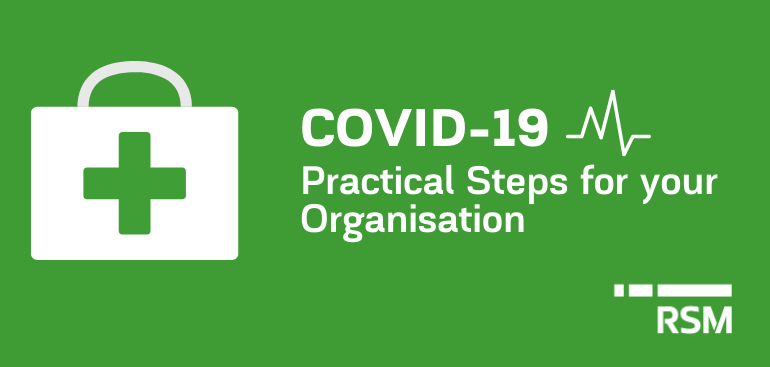
The outbreak of COVID-19 (or Corona Virus as many in the media still like to refer to it) and its current and potential implications is dominating international media and significantly affecting countries and the global and local economy. The situation is evolving daily and uncertainty is high. This makes it very hard for any organisation to plan. But plan you must.
So what are the practical steps your organisation should and can be taking?
- Don’t panic. But do take it seriously
From a quick look at the media there is no shortage of hysteria. There is also much speculation. However, wallowing in that doesn’t help. The World Health Organization has now officially classified this outbreak as an international pandemic. This evidences the seriousness and would indicate this is likely to get worse before it gets better. Hence this is not something you can afford to ignore.
Concentrate on the facts and remain objective so you can assess the existing and likely impacts on your organisation and take appropriate action.
- Keep informed & up to date
Our Government and some other agencies have helpfully leapt into action and as a result there is some great information resources out there, mostly web based. Most of these are also being regularly updated as the situation evolves, and implications become clearer. Two key websites are as follows:
Ministry of Health Website - Click here
Ministry of Business, Innovation and Employment - Click here
- Communicate
Keep your team, and as necessary your wider stakeholders, informed. People don’t expect you to have all the answers. They do however want confidence that you are taking appropriate actions.
Human nature has an annoying trait of filling vacuums with fear and misinformation. Don’t leave a communication vacuum. Part of your communication should be basic advice to your team to help them be appropriately informed and stay safe. Simple things like basic hygiene tips for example.
- Examine the essentials
During any crisis, businesses must determine which processes are critical in order to continue operations, and which processes can be suspended temporarily if necessary. You need to understand what resources are required to support critical operations. Consideration needs to include all your resources including people, plant, technology, finance, suppliers etc
- Develop staffing strategies
Similar to examining the essentials, it is worth considering what is the minimum staffing needed to support core operations? Also, who are the primary and alternate staff for core job functions? Is there enough cross training and awareness of role requirements?
Realistically if the virus hits hard it is likely that you will have staff absences and hence plans need to be in place for how you can deal with outages.
- Understand your supply chains
Make sure you are in regular contact with your key suppliers to understand their supply chains and any obvious weak points. Explore viable alternative options for key supplies that you can switch to if needed.
Explore the feasibility of holding more inventory of inputs and finished goods to reduce the impact of any future disruption.
- Time to test that BCP
OK…if you struggled to think what BCP stands for then it’s probably time to do some work.
Business Continuity Planning is the planned measures you have in place to keep operating in an adverse event. It should be a consideration of a range of scenarios and severities. For example, not having access to your building for a day, a week, a month, and what that would mean.
Ideally your BCP should be pulled together utilising a broad range of your team, and where appropriate external suppliers and experts, to help ensure a robust consideration of potential implications and available mitigations.
- How is your remote working ability?
Related to the above, remote working is likely to be a key mitigation if people are quarantined, or needing to avoid others
Businesses should review their policies and capabilities for remote work in case employees prefer to or must work from home or somewhere else that is not their usual location. Staffing plans should identify which processes can still function if employees are working remotely.
To be successful you also need to ensure that employees who work remotely have the appropriate technology and are able to access the necessary systems, data, support, and that your intended systems can handle a spike in remote use volumes.
- Stay on top of your finances
This outbreak is already having wide ranging economic impacts and mostly adverse. Sadly we expect these to get worse before they get better. The high likelihood is that all organisations will be affected to some extent.
It is therefore key to keep a close monitoring eye on your finances, and especially your cash flows. While it is too late for most to be able to strengthen their balance sheets it is important you remain cognisant of your position while you deal with day to day trading issues. Most organisations will have external providers of capital, debt and trading finance and their ongoing support is likely to be critical. Keep in touch with them and treat them with respect.
Obviously your advisors at RSM are always there to assist you.
- Remain alert for opportunities
There are always two sides to every coin and amongst all the adverse impacts of this pandemic and the financial fallout there will be opportunities….for those that remain alert, able to objectively consider, and be open to them.
Opportunities to improve how your organisation works can appear from many different angles. From within your existing business this may include process improvement opportunities such as trialing new more innovative and flexible ways of working. For example the necessity of trialing remote working for many will be an interesting experiement.
Externally there may be new and innovative supply chain collaboration possibilites and strategic alliances or opportunities.
But remember; opportunities are only available to those open to them and looking.
